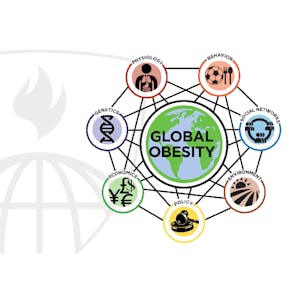Systems Science and Obesity
About this Course
Systems science has been instrumental in breaking new scientific ground in diverse fields such as meteorology, engineering and decision analysis. However, it is just beginning to impact public health. This seminar is designed to introduce students to basic tools of theory building and data analysis in systems science and to apply those tools to better understand the obesity epidemic in human populations. There will also be a lab in which students will use a simple demonstration model of food acquisition behavior using agent-based modeling on standard (free) software (netlogo). The central organizing idea of the course is to examine the obesity epidemic at a population level as an emergent properties of complex, nested systems, with attention to feedback processes, multilevel interactions, and the phenomenon of emergence. While the emphasis will be on obesity, the goal will be to explore ways in which the systems approach can be applied to other non-communicable diseases both nationally and internationally. Topics will include: a) the epidemiology of obesity across time and place, b) theories to explain population obesity, c) the role of environments and economic resources in obesity c) basic concepts and tools of systems science, d) modeling energy-balance related behaviors in context, e) agent-based models, systems dynamic models, and social network modelsCreated by: Johns Hopkins University

Related Online Courses
In this project, you will learn how to create and develop your profile on the freelancer\'s platform called Fiverr. This platform allows you to generate additional income or even become the owner... more
This is a self-paced lab that takes place in the Google Cloud console. In this lab, you use intelligent smart canvas features in Google Docs like smart chips and building blocks to assign tasks,... more
Welcome to Policy, Technology, and Carbon Free Cities, the second course in the Building Sustainable Cities Specialization. This course is intended to build upon foundational concepts introduced in... more
This advanced machine learning and deep learning course provides a robust foundation in these transformative technologies. Starting with an overview of deep learning, you\'ll explore its core... more
Ever wonder how Netflix decides what movies to recommend for you? Or how Amazon recommends books? We can get a feel for how it works by building a simplified recommender of our own! In this... more








